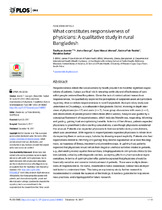| dc.description.abstract | Responsiveness entails the social actions by health providers to meet the legitimate expectations
of patients. It plays a critical role in ensuring continuity and effectiveness of care
within people centered health systems. Given the lack of contextualized research on
responsiveness, we qualitatively explored the perceptions of outpatient users and providers
regarding what constitute responsiveness in rural Bangladesh. An exploratory study was
undertaken in Chuadanga, a southwestern Bangladeshi District, involving in-depth interviews
of physicians (n = 17) and users (n = 7), focus group discussions with users (n = 4),
and observations of patient provider interactions (three weeks). Analysis was guided by a
conceptual framework of responsiveness, which includes friendliness, respecting, informing
and guiding, gaining trust and optimizing benefits. In terms of friendliness, patients expected
physicians to greet them before starting consultations; even though physicians considered
this unusual. Patients also expected physicians to hold social talks during consultations,
which was uncommon. With regards to respect patients expected physicians to refrain from
disrespecting them in various ways; but also by showing respect explicitly. Patients also had
expectations related to informing and guiding: they desired explanation on at least the diagnosis,
seriousness of illness, treatment and preventive steps. In gaining trust, patients
expected that physicians would refrain from illegal or unethical activities related to patients,
e.g., demanding money against free services, bringing patients in own private clinics by brokers
(dalals), colluding with diagnostic centers, accepting gifts from pharmaceutical representatives.
In terms of optimizing benefits: patients expected that physicians should be
financially sensitive and consider individual need of patients. There were multiple dimensions
of responsiveness- for some, stakeholders had a consensus; context was an important
factor to understand them. This being an exploratory study, further research is
recommended to validate the nuances of the findings. It can be a guideline for responsiveness
practices, and a tipping point for future research. | en_US |

